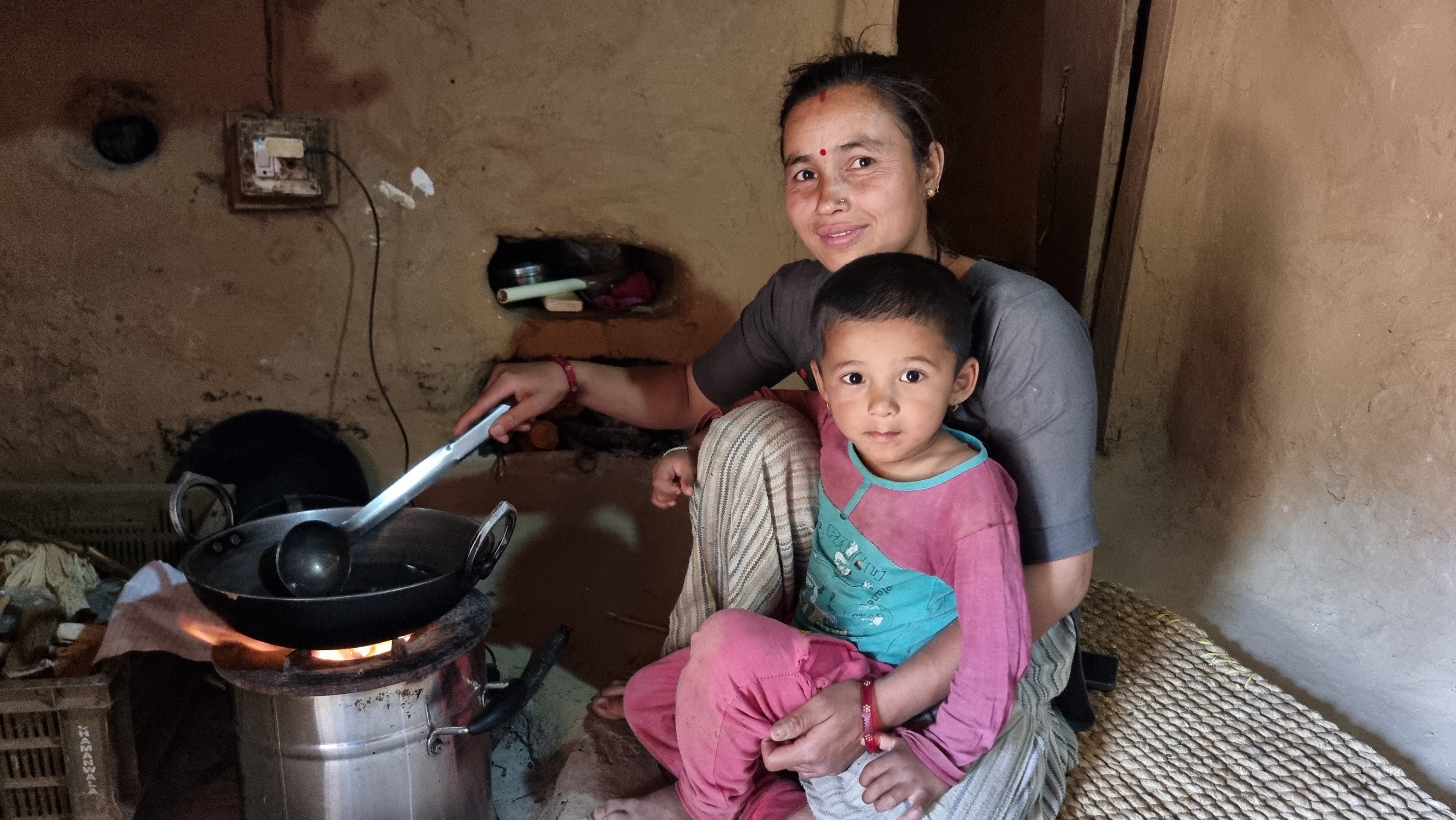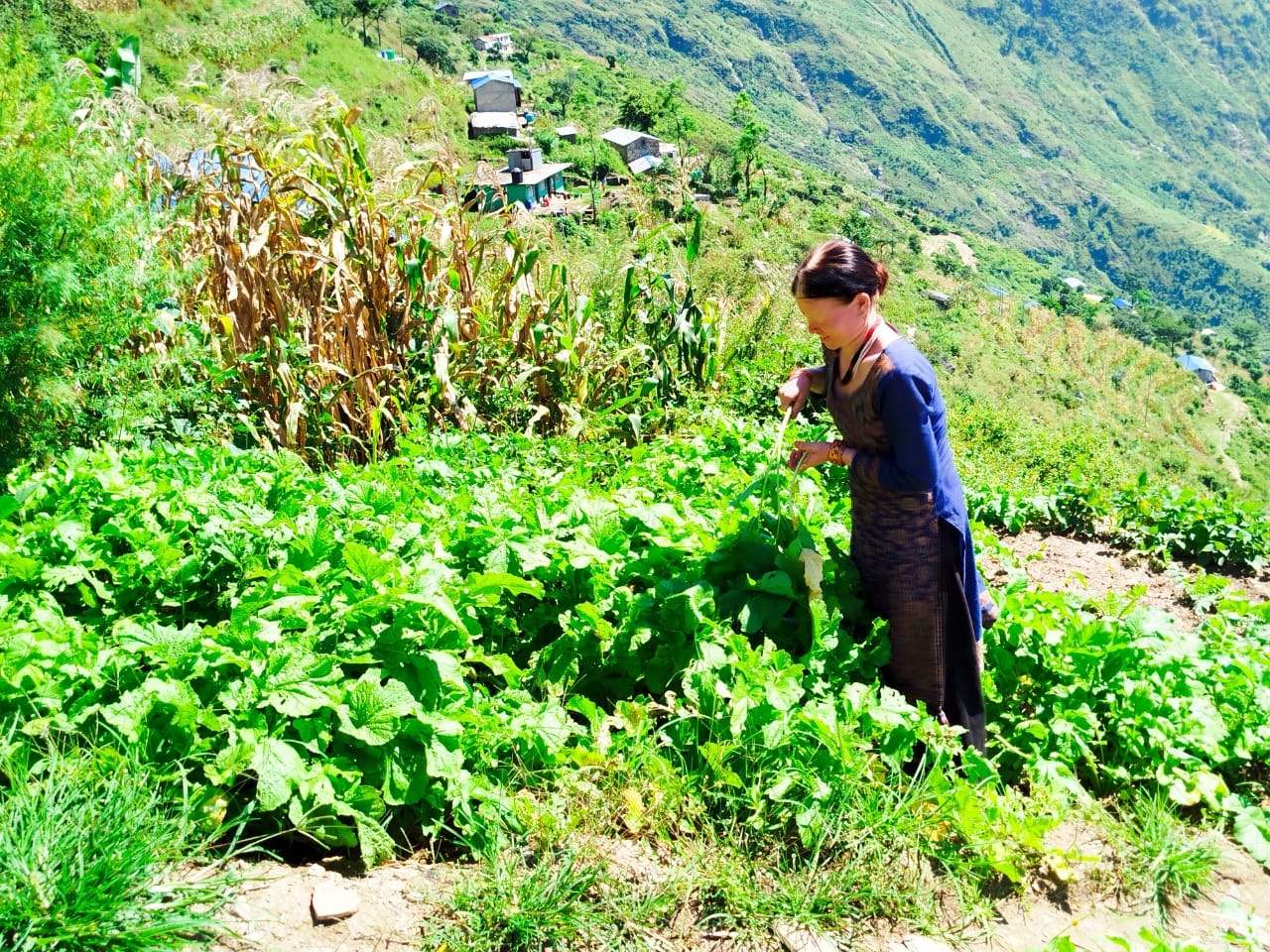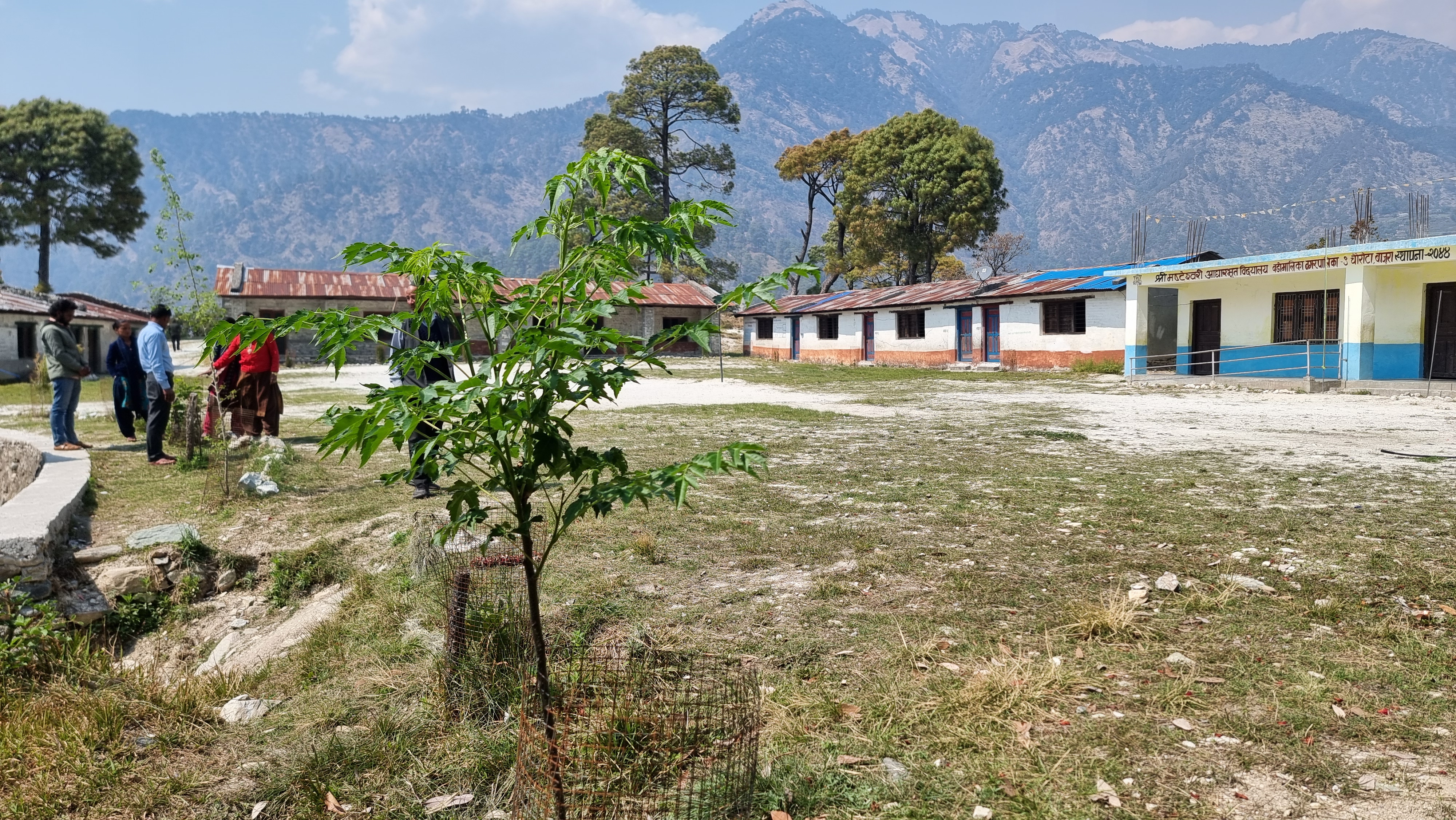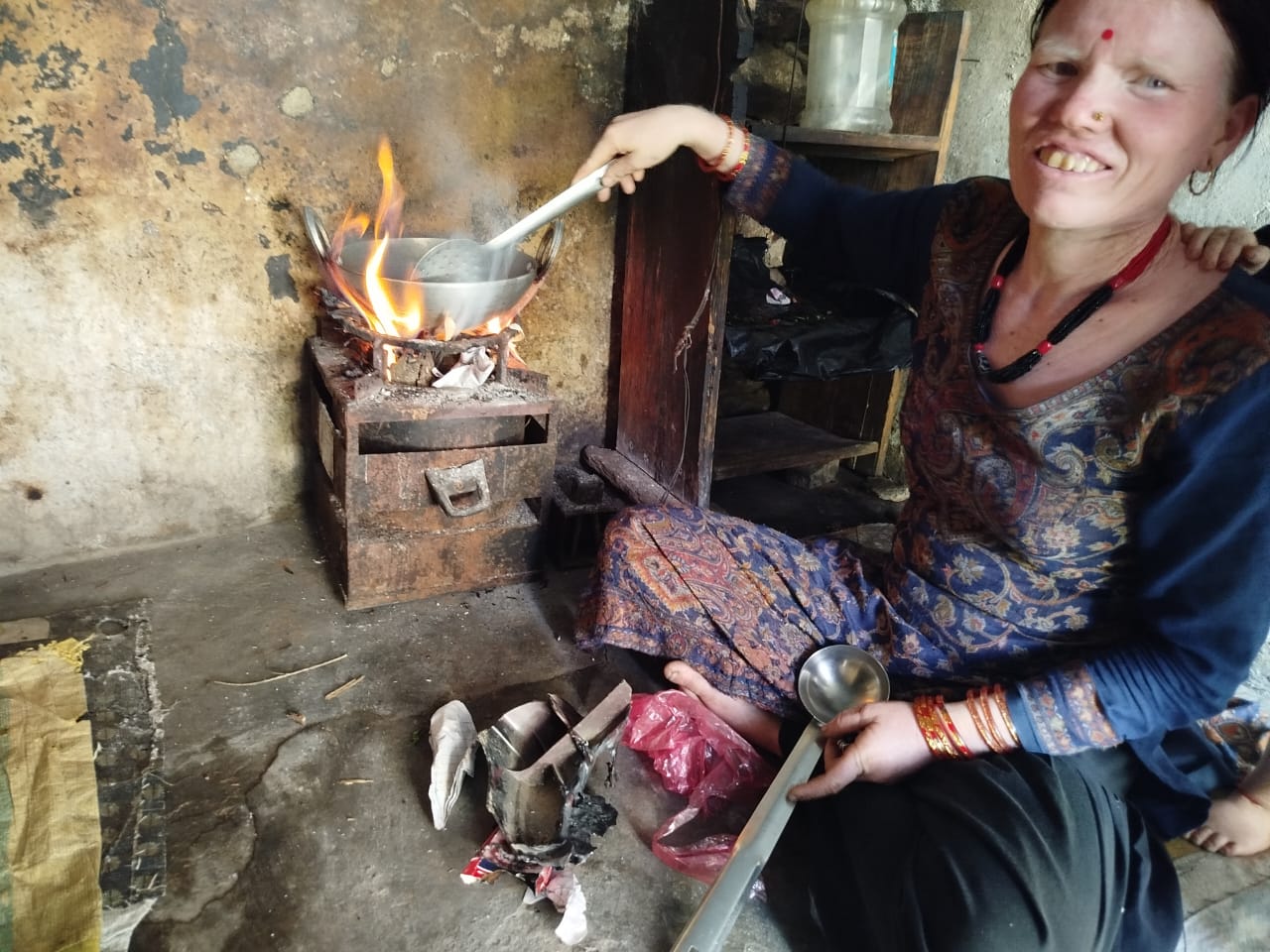Improving Access to Eco - Cookstoves and Establishing Green Zones at Schools and Health Facilities in Nepal to Address Deforestation and Air Pollution
Partner: The United Kingdom Committee for UNICEF and UNICEF Nepal
2020-2024
Location: Karnali and Sudur Pachhim Provinces, Western Nepal

Karnali - Province 6, Sudur Pachhim - Province 7
Project aims
This project aimed to establish a virtuous cycle of human development to enable local communities to conserve forests, reduce indoor air pollution and enhance local livelihood opportunities for 14,000 rural households across 6 municipalities in Karnali and Sudur Pachhim Provinces.
Key Facts and Figures
1,686 community leaders and other stakeholders trained on eco-cookstoves, their use and the dangers of air pollution and deforestation.
Cookstove distribution
11,000 improved cookstoves were distributed to households across 6 rural municipalities and training on their use delivered.
Green Zones established
7,000 tree seedlings planted across 60 schools and 30 health centres.
Capacity building
379 Female Community Health Volunteers (FCHVs) trained and 19,092 women of reproductive age oriented on the use of eco-cookstoves to reduce deforestation and exposure to indoor air pollution.
In total, 19,092 women were trained on climate change, disaster risk reduction, health, nutrition and hygiene. This included female community leaders, health facility staff, teachers, students, local government and sectoral officials, and FCHVs.
What was the problem the project set out to address?
Poor energy efficiency of cookstoves has steadily increased demand and use of fuelwood leading to accelerated deforestation, especially in Karnali and Sudur Pachhim Provinces, which have witnessed some of the highest levels of deforestation across Nepal. In addition to exacerbating forest degradation, the use of fuelwood in traditional cookstoves also has a detrimental impact on health, especially for women and children under five years who are exposed to indoor air pollution from these low efficiency cookstoves for several hours a day. Collection of fuelwood also presents several child protection challenges, disproportionately so for young girls, who are often responsible for sourcing fuelwood in the forests surrounding rural communities.
What did the project do to address this?
Over the course of 3.5 years, the project set out to reduce deforestation and indoor air pollution by providing 11,000 households, particularly women and children, with clean cooking solutions in the form of eco-cookstoves. These stoves are designed to replace inefficient and traditional cooking stoves, reducing the smoke generated, thus decreasing health risks, especially for women and children who spend more time near the stoves, due to the family role distribution in the communities.
In addition to distributing eco-cookstoves, the project facilitated afforestation and educational activities with schools and health facilities to engage communities and promote environmental and climate change awareness among children, communities, and health workers. By building capacity at the household-, school-, health facility-, and community-level, the project has improved health outcomes, enhanced household nutrition, raised awareness of environmental hazards, and encouraged community engagement in disaster risk management.
Activities and Outputs
Output 1:
11,000 households across 6 rural municipalities of Karnali and Sudur Pachhim provided with, and learn how to use, eco-cookstoves.
The project completed the procurement and deployment of 11,000 eco-cookstoves for all six municipalities, namely Raskot and Khadachakra of Kalikot District; Simta of Surkhet District of Karnali Province, followed by Badimalika and Triveni from Badura District and Ramaroshan of Achham District of Sudur Pachhim Province. These eco-cookstoves have replaced traditional stoves made of mud and bricks, and are designed and installed locally by households. Each of the recipient households have received training and know how to use eco-cookstoves.

In Triveni Municipality in far-western Nepal, Manju Thapa, one of the recipients of improved cookstoves, with her child. ©UNICEF Nepal/2023/BKJamarkattel
Output 2:
Local communities have enhanced livelihood opportunities.
After switching from a traditional stove to the improved eco-cookstove, households spent less time collecting firewood and preparing food. Women from participant households reported having more time to support the family and engage in income generating and nutrition enhancing activities, including kitchen gardening. Women's workload was also reportedly reduced as family members have begun to support cooking, due to the ease of use of improved eco-cookstoves. Additionally, UNICEF anticipates that once municipalities have begun to receive the benefits of carbon trading from eco-cookstove use, they will be able to directly or indirectly allocate more resources to enhance livelihoods opportunities in the project's target communities.

Gauri B.K. in her kitchen garden. ©UNICEF Nepal/2024/Bshahi
Output 3:
Local communities have improved their understanding of the effects of air pollution on their health.
Implementation staff of the Eco-Zone programme focused on communicating the beneficial reduction in indoor air pollution and the reduced workload of collecting firewood. Programme Implementation staff also facilitated discussions with members of children's school clubs, to engage the next generation and encourage learning about the importance of preventative climate actions and afforestation, including the impact of indoor air pollution on their own health and that of their families. External evaluation found that tree planting, environmental rallies, and child participation in conservation activities fostered widespread environmental awareness and stewardship.

The Masteshwori Basic school with plantation. ©UNICEF Nepal/2024/BKJamarkattel
Output 4:
Local governments are capacitated and sensitised to increase allocation of sectoral budget on climate change prevention and air pollution initiatives.
As part of the project, UNICEF undertook advocacy with six local government offices for increased allocation of sectoral budget on Climate, Energy and Environment (CEE) activities - with a particular focus on the climate crisis and air pollution mitigation initiatives. Through the project life, these efforts translated into local government regularly integrating CEE concerns into their annual programme and budget, as well as a significant contribution being made to the Eco-Zone project through matched funding and support to stove procurement, repair and maintenance. Of note, Achham District government implemented a Memorandum of Understanding for carbon trading and allocated a portion of its budget for the provision stove technicians to support household uptake.
Challenges and lessons learned
Behaviour change:
Encouraging the adoption of new technologies is a time-consuming and challenging process, requiring complimentary layers of awareness-raising of the health impacts of traditional stoves, engagement to promote demand for clean cooking solutions, as well as support for ongoing supply, repair and maintenance. The Eco-Zone project has played a key role in empowering local communities, particularly women and children, by fostering awareness of climate change, forest conservation, and clean energy practices, but continued sensitisation to these issues will be vital in bringing about change at scale.
Realisation of the benefits of carbon trading:
Several factors contributed to delays in the operationalisation of the carbon trading process, utilising the reduction in carbon emissions produced by project participants cooking to generate carbon revenue. This represents an additional benefit of the distribution of eco-cookstoves that will take time to set up owing to the lack of existing carbon trading policy and processes, and is yet to be fully realised. Following on from the gradual handover of the carbon trading process to Nepali government Institution AEPC and the local Project Steering Committee (PSC), UNICEF will continue to collaborate with these entities to ensure revenue generated reaches the local government and becomes another incentive for the continued allocation of resources to promote clean cooking in these communities.
Conclusion
Independent external evaluation found that 'widespread adoption of Improved Cooking Stoves (ICSs) has been particularly impactful, bringing significant health and environmental benefits. These include reduced firewood consumption, improved indoor air quality, better health outcomes, and increased time savings, all contributing to enhanced livelihoods for rural households.'
The immediate benefits to the recipients of awareness-training and eco-cookstoves are evident, in lived experience of health outcomes, to the increased time household members have as a result of becoming less reliant on firewood collection. Many of the project's capacity-building targets have been well overachieved, resulting in an increased scale of sensitisation to the importance of what may seem like a small change to make to one daily task, but which may go on to support the continued adoption of clean energy solutions in the project communities.
“There were nights we went to bed hungry because we couldn’t gather enough firewood...Now, with this improved stove, we have food, and our children can go to school on time. Now, 3 to 4 bundles of firewood per month are sufficient. It has truly transformed our lives.”
Gauri B.K., Khadachakra Municipality, Kalikot District

Gauri B.K. cooking in her kitchen using the improved cookstove. ©UNICEF Nepal/2024/Bshahi


